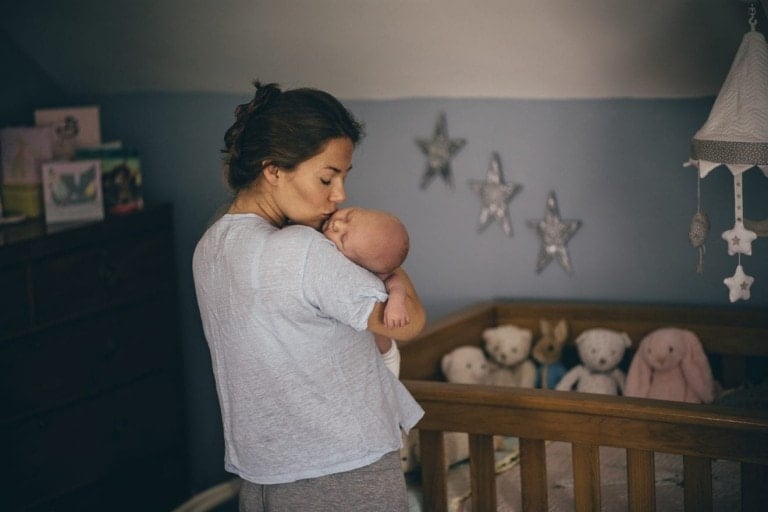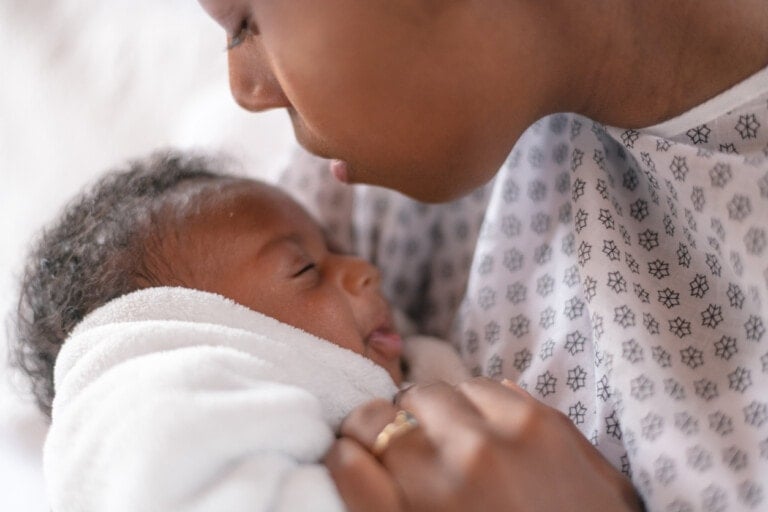There are many reasons your baby may be waking: a milestone, a growth spurt, and teething are all causes, but usually very temporary ones. However, there is usually a culprit when your baby is up all night for weeks or even months. So, let’s talk about the most common reasons babies wake up.
5 Common Reasons Your Baby Is Waking Up
Here are some reasons to consider if your baby is waking up during naps and at nighttime.
1. Baby Doesn’t Know How to “Self-Soothe”
A baby that falls asleep by rocking, feeding, bouncing, or other “prop” may expect the same when they wake between sleep cycles. Since babies have short sleep cycles, this results in frequent night wakings. The use of sleep props preventing your baby from “self-soothing” is the #1 culprit of night wakings and sleep troubles. Some babies are born self-soothers, and others aren’t. It’s okay to give your baby a couple of minutes to fall back asleep on their own when they wake up in the middle of the night. If we jump up each time they wake up and immediately pick them up or rock them, it can negatively affect them and cause them to wake up fully instead of falling back asleep.
2. Baby Is Hungry
I don’t know about you, but I can’t fall asleep if I am experiencing those hunger pains deep in my belly while I try to sleep. Chances are your baby might be feeling the same. Newborns need more frequent feeds than older infants and may even need a top-up at night. But once a baby is eating solids, with 3 well-balanced meals throughout the day, along with additional snacks, plenty of milk, and hydration, this will significantly improve your baby’s ability to sleep well throughout the night. Most experts agree that babies can typically sleep through the night between 3 and 6 months. If your baby is waking for that one feeding a little beyond that age, that should be fine, too. Often, encouraging a “tank up” before your baby goes to sleep or around dinner works for babies of all ages.
3. Baby Is Overtired
Being unable to sleep because you are overtired is often the case with adults, too. Have you ever felt like you can’t make it through until the night because you’re so tired, only to find that you suddenly have a surge of energy right before you go to sleep, making it impossible to settle? Well, babies suffer from the same thing. This is caused by a chemical response of adrenaline and cortisol to the system, making it hard to settle and relax.
4. Baby Is in Pain or Suffering Discomfort
Teething, an upset stomach, earaches, or infections can all be reasons your baby isn’t sleeping. They may even wake up because they’re too hot or cold. Or you may have just changed their diaper only to find them unable to go to sleep because they made a last-minute poop and are uncomfortable sitting in it!
5. Baby Is Too Excited To Sleep
Overstimulation before bed is often a cause of why babies won’t go to sleep. Getting them tired out with fun play does help to an extent; however, getting an already tired baby overexcited can lead to them to being overtired. Exposure to television or electronic devices can also cause overstimulation. Encouraging a “winding down” period before bed is very helpful. You can do this by giving your baby a relaxing bath, playing calming music, or enjoying warm cuddles with your little one.
































